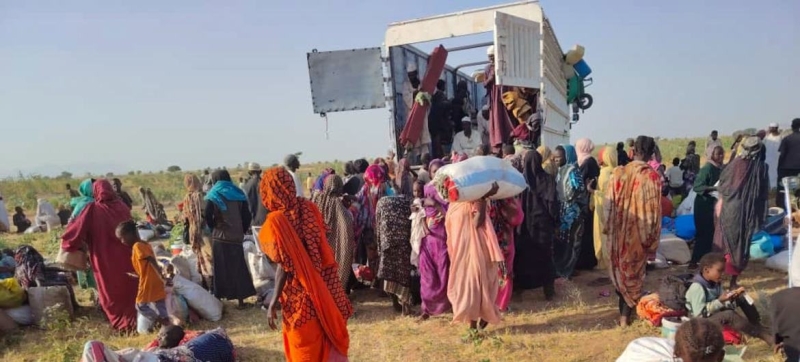- Inqilab Monch Seeks Home Adviser’s Exit |
- UN Calls for Calm in Bangladesh After Protest Leader’s Killing |
- DMP issues 7 traffic directives for Osman Hadi’s Janaza |
- Vested quarter fuelling chaos to impose new fascism: Fakhrul |
- Hadi’s namaz-e-janaza at 2:30pm Saturday |
89,000 Flee El Fasher as Conflict Widens Across Sudan

People who have fled El Fasher in Darfur receive aid in Tawila.
The UN Office for the Coordination of Humanitarian Affairs (OCHA) on Monday warned of a worsening crisis in North Darfur as violence spreads beyond the city of El Fasher.
Since the Rapid Support Forces (RSF) — which has been fighting the military government — seized El Fasher after more than 500 days of siege in late October, nearly 89,000 people have fled from Tawila, Melit, Saraf Omra, and other nearby areas.
Some families have sought refuge in Tina, near the Sudan–Chad border, where already strained host communities and humanitarian partners are preparing for new arrivals, UN Deputy Spokesperson Farhan Haq told reporters in New York.
Meanwhile, violence is escalating in the Kordofan region, causing rising civilian casualties and triggering fresh waves of displacement.
The UN has called for an “immediate cessation of hostilities,” the protection of civilians and aid workers, an end to attacks on hospitals and civilian infrastructure, and unhindered humanitarian access.
De-escalation Efforts
The UN Secretary-General’s Personal Envoy for Sudan, Ramtane Lamamra, has invited both sides to enter technical talks focused on de-escalation and civilian protection, Haq said. The envoy has held consultations with the African Union, Egypt, Saudi Arabia, the United Arab Emirates, the United States and other stakeholders.
The UN is working with partners to secure a ceasefire after two and a half years of war and to ensure humanitarian access, but “so far there’s been no real progress to report,” Haq added.
Climate Compounds Conflict
A new report released Monday by the UN refugee agency (UNHCR) warns that the crisis on the Sudan–Chad border is being intensified by the impact of climate change.
By mid-year, 117 million people worldwide had been displaced by conflict and persecution, while some 250 million have been internally displaced by weather-related disasters in the past decade.
Sudanese who have fled to Chad face severe shortages, with many new arrivals receiving less than 10 litres of water per day — far below emergency standards. Chad and South Sudan, which has taken in nearly 1.3 million people from Sudan since April 2023, are among the countries least equipped to withstand the climate emergency.

